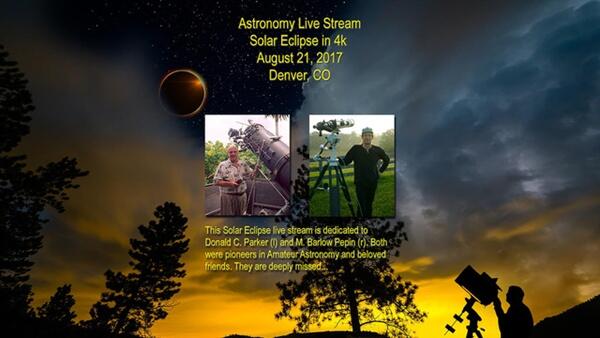On August 21, chances are that if you’re able to get yourself into the path of totality on the continental U.S., you will. But what if you can’t travel into totality, or what if it’s cloudy at your location? That’s where livestreaming comes in: Astronomy.com will offer a livestream of the 2017 Great American Eclipse.
Our high-resolution 4K livestream will be provided by David Brewer, a current member of both the Denver Astronomical Society and the Southern Cross Astronomical Society. He is also the past vice president of the Central Florida Astronomical Society. Brewer has been video recording and photographing the night sky for 35 years, and now he’s excited to bring the eclipse in HD to Astronomy.com visitors.
During the eclipse, Brewer will stream the view from Denver, Colorado. Although Colorado will not experience the total eclipse, the Sun will undergo a 92 percent partial eclipse at maximum coverage in Denver. Brewer will livestream the event using his Celestron EdgeHD 800 telescope and Sony A7RII mirrorless camera. You can tune in at any time to check the progression of Moon as it passes in front of the Sun from start to finish.
A long history
Brewer has been video recording the night sky since 1985, improving his techniques and obtaining new equipment as advancements are made. But several years ago, he hit a snag – his observatory was broken into and his telescopes and camera equipment stolen. It was disheartening and devastating, putting his passion for pursuing amateur astronomy and astrophotography on hold.
But three years ago, Brewer purchased a Sony A7RII camera, and soon found himself wanting to image the sky once more. He now owns a Celestron EdgeHD 1100 telescope in addition to his EdgeHD 800 and streams the night sky regularly in HD for people not only across the United States, but around the world to see.
As the eclipse approached, he realized he wanted to stream this breathtaking event in 4K. And after several tests to determine whether 4K astronomical livestreaming was possible, the answer is unequivocally yes.
Livestream dedication
Brewer wishes to dedicate his August 21 total eclipse livestream to two late friends who shared his passion for video recording the sky: M. Barlow Pepin and Donald C. Parker.
Pepin authored the 1989 Astronomy magazine article “Recording the Sky on Videotape;” he also worked as an editor for Sky & Telescope and the Astronomical League’s newsletter, “Reflector.” He later authored the book Care of Astronomical Telescopes and Accessories, but passed away suddenly the month it was published and never saw it come to fruition. Pepin and Brewer were friends for at least a decade, and Brewer remembers spending time together on the weekends watching the night sky while listening to Pepin’s shortwave radio.
Brewer met Parker in 1988. Parker helped him take his videotaping of the sky to the next level, using an IBM 386 computer. Parker was also the head of the Association of Lunar & Planetary Observers Mars section and highly skilled at capturing the Red Planet on film and, later, computer. Even as Brewer’s technique improved, he would continue to call Parker whenever he captured Mars on video.
Get ready for eclipse day
As the eclipse approaches, it’s important to know where you’ll be when totality hits. If you won’t be able to make it outside and into the path, we invite you to watch the eclipse live in 4K via the expertise of David Brewer. Brewer himself is in the midst of conducting test after test with his equipment to ensure he’ll be ready to record as this important event begins.
Keep an eye on Astronomy.com for further updates on eclipse viewing and the upcoming URL for our first-ever HD livestream of a solar eclipse.
Source: http://bit.ly/2vai02d











